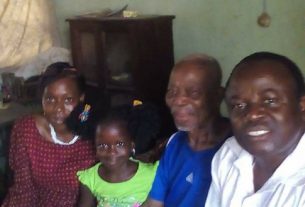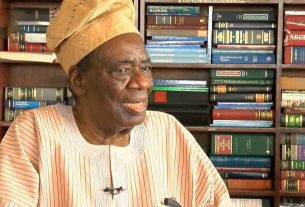By Yinka Fabowale
Igi da! Araba wo oo ooo!
More than a king, he was a scholar versed in the ancient lores, historycustoms and traditions of not just Yorubaland but other peoples across the world.
Often visited the National Archives in the University of Ibadan to conduct research, prodded Palace bards and chiefs for indepth details of what he heard from them, and explanations behind some cultural practices and rites.
One of such investigations, he told me, once led him to discover that one of the ancient predecessors (can’t remember who or what Century he reigned now, perhaps Sango, was actually a Muslim convert and Koranic scholar long before Uthman Dan Fodio showed up in northern Nigeria.
He got curious when one of the Palace poets while chanting his panegyric one day traced his pedigree to the old Alaafin who, the praise singer called ‘Akewugba…something, something…’ (again, pity, I forgot the correct cognomen but which translates to an erudite Koranic scholar.
Kabiyesi had then beckoned the fellow to provide insights into how that could have been. The man obliged relating the story handed down to him through oral tradition which the King’s later research corroborated!
He made the disclosure in an interview I had with him while still reporting for The Guardian over his perceived aloofness to the membership and active participation in the National Council of Traditional Rulers co-chaired by the Sultan of Sokoto and the Ooni of Ife; as well as his apparent non-recogntion of the Sultan as the Supreme head of Muslims in the country.
However, he asked me to consider the information as off-record due to the sensitivity of the matter and other issues at the time.
Sitting with him, just like with Dr. Omololu Olunloyo, was like having a loaded and marathon seminar with a genius with versatile knowledge on virtually every subject, in his case particularly the history and traditions of the Yoruba people.
There’s hardly any Yoruba kingdom or town in Yorubaland including outside Oyo State where there was a chieftaincy tussle that Kabiyesi would not have something to say about the stool, in contention, past occupants, the royal houses, conditions for ascension, etc.
To that end, he had helped tremendously in resolving many a such squabble in many South West communities, as he had also been accused of using that to prop up proteges, attempt to extend his sphere of influence and stir crises!
One thing you couldn’t take away for him is his conscious pride in the recognition of his heirdom as the inheritor of the Leadership of a once great empire and civilisation and readiness to fiercely defend this legacy.
In his leisure time, Baba was great fun to watch and be with.
Besides his wit and humour, he left no one in doubt that he was one of the greatest embodiments and custodian of African arts and culture.
Come to Oyo Palace when he decides to ‘play’ with the minstrels and drummers in the courtyard!
Man, you have never seen a more entertaining monarch. With just a light dress, often Danshiki or Buba with a necklace of jewels and studded wrist beads he invites the drummers, singers and women around to a performance by first gently swaying to their music which was automatically commanded by his appearance and presence, and then, suddenly charging into their midst with the deft steps of an expert Bata dance.
It was a cue and a challenge which the men and women cheerfully take up in reciprocation of their master’s appreciation of their labour.
The decibels of the songs would mount, the Bata beats surge energetically to the syncopation of Iya Ilu, Omele, gudugudu, Sekere, the gongs and other musical instruments.
All the while shouts of “Kabiyesi!” “Iku Baba Yeye”, “Alowolodu” (the one with a house full of wealth and treasure) would rent the air amid non-stop chanting of his panegyric by his praise-singers!
Often, the monarch raises the charged level of excitement. He seizes the biggest Sekere from one of the players, throws it high up and catches it mid-air with the dexterity only veterans of the art can manage, to the admiration of the crowd!
Sometimes, he led in the singing or the songs many composed by himself fashion!
Yet, the majestic aura around him is unmistakably perceptible in his look, gait, comportment and words.
He has shown that he was a king who was well-prepared for the role and the office.
With his demise, the Yoruba people may realise they have just lost an intrepid leader, lover and fighter of the cause of the ‘race’, an institution whose personality alone, perhaps, is a restraint on other groupings which would rather ride roughshod over them,
A man of wisdom, Oba Lamidi Adeyemi will definitely be missed.





